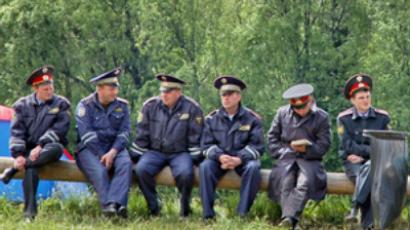Interview causes scandal in Moscow riot police unit
A group of Moscow policemen subjected their superiors to sharp criticism in an interview published on February 1. The accusations extended to illegal use of crack units for personal protection and fights over property.
Titled “The slaves of OMON”, the article caused a major scandal in the Moscow police force.
According to the magazine The New Times, known for its extreme criticism towards Russian government, the policemen sent a letter to President Dmitry Medvedev expressing their deep dissatisfaction with conditions of work, but never got an answer.
In their address, special police officers mentioned such facts as being forced to work 10-15 days straight without days off, working 20 hours a day without lunch breaks, and having a forced minimum of people to detain per day under a threat of reducing the policemen’s bonuses.
“The bosses are engaged in commercial activities – for them it’s a business. They didn’t care about their staff. We worked 25 days a month, even though our official schedule was two days on, two days off. We often had arguments over it and eventually the battalion commander said, ‘We don’t need people like you’. Some of the old-timers left before us. We were the longest-serving members remaining and he finally decided to get rid of us,” said Aleksey Volnushkin, former member of the special task force.
They also claimed that their bosses are making money by renting out officers to private companies, and even using them to protect prostitution rings.
Despite the authors of the letter calling themselves actual employees of OMON, Zhanna Ozhimina, Moscow Directorate of Interior Affairs’ deputy head of Information Department, said that they were fired in 2009 after a major scandal.
“Correspondent of the media where the story was published knew that, but refused to publish our official comment,” stated Zhanna Ozhimina.
“They were fired in early December for misconduct after two foreigners complained they robbed them while on duty. They are under criminal investigation at the moment. I have been serving in the unit for 27 years and all their allegations are simply libel,” explained Sergey Evtikov, commander of the second battalion of the special task force.
Three of the policemen are suspected in a robbery attempt and soon are going to be charged. One of them was fired after multiple attempts to fake a medical certificate.
Such statements have been made numerous times, Ozhimina added. Several inspections based on the claims have been made, and no claim has been proved, she said.
Meanwhile, The New Times journalists insist they have no doubts that everything written in the article is true. Ilya Barabanov, one of the authors of the controversial piece, claims he has seen the policemen's awards and documents.
“Publicity is the only thing that can help them in the current situation, even though I don't think they'll continue serving in the police for long after the scandal, regardless of whether their allegations are true or not… but who knows?” – says Barabanov.
An investigation will follow this case, said Mikhail Sukhodolsky, first deputy of the Interior Minister.
“All the facts mentioned in the article will be examined. In case they are proved – which I really doubt – the culprits will be punished severely,” he said. If the allegations are found false, the Interior Ministry will protect their employees in accordance with Russian law, Sukhodolsky emphasized.
The head of OMON has urged journalists from The New Times to check the situation and work methods in Moscow’s OMON themselves.
The officers of Moscow’s special police have taken the decision to sue The New Times magazine to defend the unit’s honor and dignity.
In an official statement published on the Moscow police’s website, the article has been roundly condemned because “there is a strong presumption against the truth of the news.”
One of the largest in the world, Russia’s police force has long been plagued by allegations of corruption and negligence. But the year 2009 was brutal even for its already tattered reputation. A series of Internet exposés, followed by numerous cases of policemen turning their guns on citizens, forced the government to launch a wide-ranging reform of law enforcement.
A Moscow based journalist, Leonid Radzikhovsky, says, “A few years ago they wouldn't have made a scandal out of it but now, when a campaign against the police force's leadership is underway, many officers are using it to settle their old scores. It doesn't mean that what they're saying isn't true, but for some time they were more or less content with it.”
Boris Kagarlitsky from the Institute of Globalization and Social movements thinks that this scandal is meant to add pressure on the decision makers.
“This is something which can be interesting for quite a few different political forces or political tendencies inside of the country because definitely there are plenty of people who hate the police and, of course, when you see all these stories coming out they will just say – oh, that’s true, that’s how it is,” Kagarlitsky told RT. “Though, in fact it’s not necessarily guaranteed that it’s all true. What is guaranteed is that there are serious forces behind this story – people who want to hold a debate on OMON.”
While previous whistle blowers have won public sympathy, some say they are only adding insult to injury, making the task of overhauling the police force ever more taxing.They're despised because they're cops, but as whistleblowers commended for their courage in exposing the failures of the police. Yet, often, their revelations come after years of serving the system and years of taking full advantage of it.














